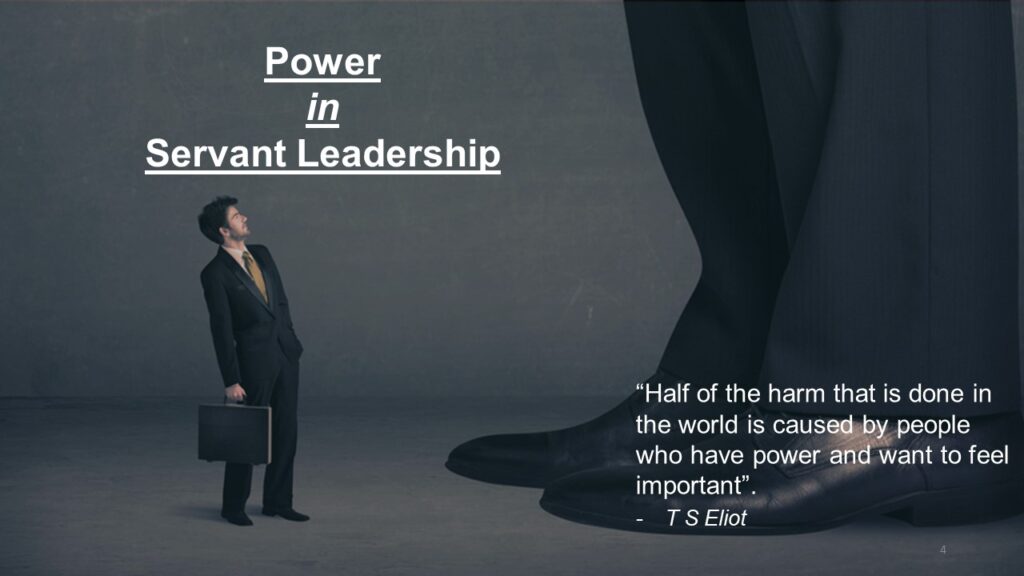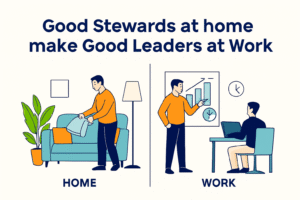Leadership and Power has always been bed-fellows. We cannot think of one without the other. If we go with the definition that “Leadership is Influence”, then no one is really exempt from being a Leader. Does that mean everyone has some sort of power of otherwise? Researchers agree that we all have power, immaterial of whether hold positions or not. Social Psychologists John R. P . French and Bertram H. Raven conducted a remarkable study about power in 1959 and classified power into 5 separate and different forms. Susan Fowler and Ken Blanchard in their book, Self-Leadership and the One minute Manager speaks about 5 Points of Power that Self-Leaders need to be aware of. As they put it
“Not realizing your own power could be your greatest assumed constraint.”
In my studies about power, we have seen that each power that we have as an individual or as a leader can be used appropriately or can be misused. History records more of misuses than right uses of power. That is what prompted T S Eliot to say
“ Half of the harm that is done in the world is caused by people who have power and want to feel important.”
I am sure we nod our heads in agreement at the quote by T S Eliot. We can reel out names of dictators and military generals and politicians who have proven this right, and many continue to prove this saying right even today.
Corporates are not devoid of this malady either. It is an accepted norm for “Leaders” to have a bigger office, a reserved parking space, priority seating and servicing at office cafeteria etc. We have come to accept them as part of the office culture and normally do not worry about it. On a lighter note, we might have a laugh if we see an executive rest room in the office premises.
Simon Sinek, in his book, Leaders eat last, talks about the former Merrill Lynch CEO Stanley O’Neal. Stan’s story is a true rags to riches story that Ivy League Management Schools drool over. He did make it really big. He made it to the top position at Merrill Lynch in 2002. In his own words
“Whatever I have achieved in life has been the result of the unique combination of luck, hard work, and opportunity that can only exist in this country. My grandfather, James O’Neal, was born into slavery in 1861.”
In the same year that he took over the CEO position at Merrill Lynch, O’Neal was named the “Most Powerful Black Executive in America” by Fortune magazine.
Further instances show that he used that power in a very self-centered manner. He had his own private elevator to go to the 32nd floor and he restricted entry of employees to the floor. He used his power to feel important, and thereby became secluded. This infiltrated into the leadership culture of the organisation. The New Yorker reports that some staffers were referring to the firm’s leaders as “the Taliban” and to O’Neal as “Mullah Omar.” Stan is known to have kept away from the employees and was in touch with only a handful of “faithful” ones. Many analysts believe that this was one of the major reasons for his downfall.
He was forced to retire in October 2007, due to the pathetic performance of the company. The legacy that he left was not pleasant. Jim Cramer, the host of “Mad Money,” on CNBC, wrote “This man was Wall Street’s Wicked Witch, a much-feared, totally unrespected hatchet man who appeared to be beloved by his troops but in reality didn’t have a friend in the joint. . . . I swear you could hear the cheering from downtown after he left.”
On the other hand, Herb Kelleher, who founded the Southwest Airlines, had a very different idea about Power. He said
“Power should be reserved for weightlifting and boats, and leadership really involves responsibility.”
And several analysts agree that he was not faking anything. Terry Maxon of Dallas Morning News reports
“Whether it’s hugging and kissing co-workers at a meeting or making a 2 a.m. visit to a maintenance hangar, Mr. Kelleher is not happy unless he’s talking with employees.”
And what legacy did he leave? Apart from leaving behind the worlds’ most profitable airline company, he also left several thousand employees raving fans of himself. Take a look at what the employees did to thank him.

And that legacy did live on in Southwest. Collen Barret , another rags to riches story, and the first woman to have headed a major airline company, took over the President role from Herb. Colleen says
“85% of my time is spent on employees and delivering pro-active customer services to employees.”
Closer home, Girish Kuber, who wrote the book “The Tatas – How a Family built a Business and a Nation” narrates the story of Jehangir Ratanji Dadabhoy Tata , more popularly known as JRD. One of the first actions that JRD did was to take away the special privileges of officers in Tata Steel Plant at Jamshedpur. This included the special reserved lift for the Managing Director, Special dining areas for officers, and special toilets for officers. If you think this was no big deal, think again. This action was taken in the early 1940’s, when such privileges’ were considered absolutely normal. It was the time of British Raj and sahibs in India. JRD used his powers to make everyone equal, instead of seeking importance for himself or the others in office.
It is not the absence of power that differentiates Servant Leaders from Traditional Leaders. It is the conscious choice that they make to use the power that they have for the benefit of the employees. Shakespeare knew it well. He said in his Sonnet No 94
They that have power to hurt and will do none,
That do not do the thing they most do show,
Who, moving others, are themselves as stone,
Unmoved, cold, and to temptation slow,
They rightly do inherit heaven’s graces
Join the Servant Leadership Movement and exercise the powers that you have for a Higher Purpose.
______________________________________________________________________________________
 Dr. Madana Kumar is the Servant Leadership Evangelist at Leadyne. You can contact him here.
Dr. Madana Kumar is the Servant Leadership Evangelist at Leadyne. You can contact him here.




Comments are closed.